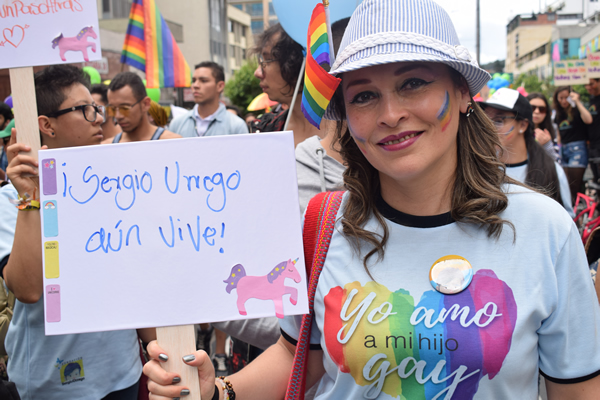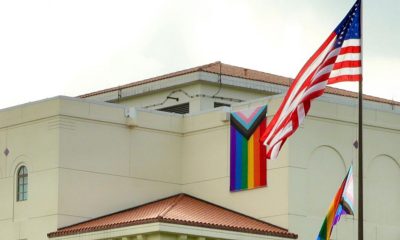News
Madre de Sergio Urrego lucha contra el bullying en Colombia
Alba Lucía Reyes Arenas se convirtió en una activista vocal


Alba Lucía Reyes Arenas en Bogotá, Colombia, el 24 de septiembre de 2018. Su hijo, Sergio Urrego, se suicidó en 2014 después de ser víctima del bullying homofóbico por parte de la administración de su colegio en la capital colombiana. (Foto del Washington Blade por Michael K. Lavers)
Ella dijo al Washington Blade el 24 de septiembre durante una entrevista en la capital colombiana de Bogotá que le gustaba la opera desde era “bien joven” y leyó su primer libro, “Historias sin fin,” cuando tenía seis años. Reyes dijo que su hijo era ateo y le gustaba el arte y las políticas.
Urrego también era miembro de un grupo de estudiantes anarquistas.
“Tengo muchas cosas que contarte,” dijo Reyes. “Para todas las mamás, nuestros hijos son muy especiales, pero Sergio si es desde era una personita si se interesaba por las cosas que son eran más de su edad.”
Urrego tenía 16 años cuando se suicidó el 4 de agosto de 2014.
Administradores y un psicólogo al colegio católico de Urrego en Bogotá lo atacaron después de que un maestro vio una foto de él besando a su novio en su móvil.
Los padres del novio de Urrego le acusaron de abusar sexualmente a su hijo. Urrego debía haber comenzado a asistir otro colegio el día después de su suicidio.
La muerte del hijo ‘fue algo angustiaste’
Reyes estaba en la ciudad colombiana de Cali cuando supo por primera vez que algo andaba mal con su hijo.
Ella regresó a Bogotá y llegó a su hogar alrededor de las 9:30 p.m. Reyes dijo entre lágrimas que la primera cosa que encontró era una nota con “letra muy grande” de su hijo.
Reyes dijo que al principio pensó que se lo había dejado a su madre, pero fue por ella. Reyes dijo al Blade que su hijo escribió, “Yo no podía ir al colegio porque se me presento un problema.”
“Cuando yo vi esta nota, yo dije algo pasó,” ella dijo.
Reyes dijo que luego fue al dormitorio de su hijo y encontró libros en su cama y una nota que le pedía que se los diera a sus mejores amigos. Reyes también encontró otras notas que su hijo había escrito antes de su suicidio.
“Fue algo angustiaste,” ella dijo. “Fue doloroso.”
Ley colombiana ahora prohíbe discriminación homofóbica en escuelas
La muerte de Urrego provocó indignación entre los activistas LGBTI en Colombia.
Reyes el 11 de septiembre de 2014 presentó una tutela contra del colegio de Urrego.
Un tribunal en Bogotá, unas semanas después, falló que Urrego había sido víctima de discriminación, pero Reyes no recibió ningún daño y el fallo no ordenó al Ministerio de Educación de Colombia que revisará las políticas del colegio.
Reyes apeló el fallo ante el Consejo de Estado, que considera las apelaciones de los tribunales administrativos. El entonces Procurador Alejandro Ordóñez — un oponente vocal de los derechos LGBTI que el presidente Iván Duque el pasado mes nombró como el nuevo embajador colombiana ante la Organización de Estados Unidos — falló en contra de Reyes basándose en que las escuelas tenían el derecho de prohibir “los besos y los abrazos.”
La rectora del colegio, Amanda Azucena Castillo, renunció el 10 de octubre de 2014. La Corte Constitucional de Colombia el 21 de agosto de 2015 revocó la decisión del Consejo de Estado y falló a favor de Reyes el 11 de diciembre de 2015.
Escuelas en Colombia no pueden discriminar en contra de sus estudiantes por razón de su orientación sexual. Una enmienda a la ley de no discriminación que incluye el nombre de Urrego también requiere que las escuelas colombianas actualicen sus políticas para garantizar que no sean discriminatorias contra la comunidad LGBTI.
‘Siempre me acompaña’
Reyes desde la muerte de su hijo se ha convertido en una activista vocal contra el bullying.
Ella estaba entre los 31 activistas LGBTI desde todo el mundo que asistió una cumbre del Human Rights Campaign que se realizó en Washington en abril.
Reyes en mayo viajó a Cuba para participar en eventos del Día Internacional contra la Homofobia, la Transfobia y la Bifobia que fueron organizados por el Centro Nacional de Educación Sexual (CENESEX). Mariela Castro, la directora del CENESEX que es la hija del expresidente cubano Raúl Castro, invitó a Reyes de participar en un taller a la sede del CENESEX en La Habana.
Reyes este año lanzó oficialmente la Fundación Sergio Urrego, que busca poner el fin a la discriminación en las escuelas colombianas y evitar el suicidio entre ellos que sufren la discriminación.
El dijo al Blade que el suicidio es la segunda causa de muerte en “nuestros jóvenes.” Reyes también notó estadísticas que indican 192 personas entre las edades de 15 y 24 en Bogotá se suicidaron este año.
“Es algo que aquí no se toca,” ella dijo. “No hay una institución que se brindando atención inmediatamente a los niños que están en crisis.”
La fundación ha respondido a casi 70 casos. También tiene talleres para niños y padres en empresas y en otros lugares por el país.
“Mi propósito es evitar que casos como los de Sergio de se sucede,” dijo Reyes.
Reyes en julio habló a un concierto en la Plaza Bolívar de Bogotá durante las celebraciones del Orgullo de la ciudad. Se terminó el 25 de septiembre una campaña de los medios sociales de la fundación con el hashtag “Celebro soy yo” que buscaba dar recursos y seguridad para aquellos que sufren discriminación.
“Esa campaña me da fuerza para continuar, para seguir,” dijo Reyes. “Ese tipo de campaña se ayudan. Ese tipo de campaña llegan al corazón de la gente.”

Alba Reyes participa en una marcha del Orgullo en Bogotá, Colombia, el 1 de julio de 2018. (Foto cortesía de Fundación Sergio Urrego.)
Reyes terminó la entrevista por decir que su hijo sería orgulloso de ella y del trabajo que hace en su nombre.
“Sea un angelito,” ella dijo. “Siempre me acompaña.”
District of Columbia
Two charged with assaulting, robbing gay man at D.C. CVS store
Incident occurred after suspects, victim ‘exchanged words’ at bar

D.C. police just after 1 a.m. on April 10 arrested two men for allegedly assaulting and robbing a gay man inside a CVS store at 1418 P St., N.W., according to a police report and charging documents filed in D.C. Superior Court.
The charging documents state that the alleged assault and robbery occurred a short time after the three men “exchanged words” at the gay bar Number 9, which is located across the street from the CVS.
The arrested men are identified in the charging documents as Marquel Jose Diaz, 27, of Northwest D.C., and Lorenzo Jesse Scafidi, 21, of Elizabeth City, N.C. An affidavit in support of the arrest for Diaz says Diaz and the victim “were previously in a relationship for a year.”
Court records show Diaz was charged with Simple Assault, Theft Second Degree, and Possession of a Controlled Substance. The court records show the controlled substance charge was filed by police after Diaz was found to be in possession of a powdered substance that tested positive for cocaine.
Scafidi was charged with Simple Assault and Theft Second Degree, the court records show.
The D.C. police report for the incident does not list it as a suspected hate crime.
The court records show both men pleaded not guilty to the charges against them at a Superior Court arraignment on the day of their arrest on April 10. The records show they were released by a judge while awaiting trial with an order that they “stay away” from the victim. They are scheduled to return to court for a status hearing on May 21.
The separate police-filed affidavits in support of the arrests of both Diaz and Scafidi each state that the two men and the victim “exchanged words” inside the Number 9 bar. The two documents state that both men then entered the CVS store after the victim went to the store a short time earlier.
Scafidi “came into the CVS shortly after and entered the candy aisle and slammed Complainant 1 [the victim] to the ground causing Complainant 1’s phone to fall out of CP-1’s pocket,” one of the two affidavits says. It says Scafidi “again picked up CP-1 and slammed him to the ground.”
The affidavit in support of Diaz’s arrest says Diaz also followed the victim to the CVS store after words were exchanged at the bar. It says that after Scafidi allegedly knocked the victim down in the candy aisle Diaz picked up the victim’s phone, “swung on” the victim “while he was still on the ground,” and picked up the victim’s watch before he and Scafidi fled the scene.
Without saying why, the two arrest affidavits say Diaz and Scafidi returned to the scene and were arrested by police after the victim and at least one witness identified them as having assaulted and robbed the victim.
Attorneys representing the two arrested men did not respond to phone messages from the Washington Blade seeking comment and asking whether their clients dispute the allegations against them.
The victim also did not respond to attempts by the Blade to obtain a comment from him. The police report says the victim is a resident of Fairfax, Va.
El Salvador
Gay Venezuelan makeup artist remains in El Salvador mega prison
Former police officer said Andry Hernández Romero was gang member because of tattoos

A new investigation points to a discredited, former police officer who played a “key role” in the wrongful deportation of Andry Hernández Romero, a gay asylum seeker and makeup artist who was sent to a maximum security mega prison in El Salvador under Trump’s Alien Enemies Act.
USA Today found in a recent investigation that the former Milwaukee police officer who filed the report about Hernández, citing his tattoos as the reason for the gang affiliation, has a long history of credibility and disciplinary issues in his former police officer position.
The private prison employee who previously worked as a police officer until he was fired for driving into a house while intoxicated — among other alcohol-related incidents — “helped seal the fate” of Hernández.
The investigation by USA Today found that the former police officer accused Hernández of being a part of the Tren de Aragua gang because of his two crown tattoos with the words “mom,” and “dad,” which are now being identified as Venezuelan gang-related symbols.
Since then, his story has made headlines across the nation because Hernández has no criminal record and is legally seeking asylum in the U.S. due to credible threats of violence against him in Venezuela because of LGBTQ persecution.
He was targeted shortly after Trump invoked the Alien Enemies Act of 1798, which is a proclamation for all law enforcement officials to “apprehend, restrain, secure, and remove every Alien Enemy described in section 1 of [the] proclamation.”
Charles Cross, Jr., the former police officer, signed the report which wrongfully identified Hernández as a gang member. Cross was fired in 2012 after many incidents relating to his credibility and how it was affecting the credibility of the department to testify in court.
He had already been under investigation previously for claiming overtime pay that he never earned. In 2007, he had also faced criminal charges for damage to property, according to court records.
In March, the Washington Blade spoke with the Immigrant Defenders Law Center Litigation and Advocacy Director Alvaro M. Huerta regarding the case and stated that “officials with U.S. Immigration and Customs Enforcement and U.S. Customs and Border Protection alleged his organization’s client was a member of Tren de Aragua, a Venezuela-based gang, because of his tattoos and no other information.”
Hernández came to the U.S. last year in search of asylum and now makes up one of 238 Venezuelan immigrants who were deported from the U.S. to El Salvador, Honduras and Venezuela. Many of those being deported are being sent to the Center for Terrorism Confinement, a maximum-security mega prison in El Salvador, which has been accused of human rights violations.
According to the investigation, the Department of Homeland Security “wouldn’t offer further details on the case, or the process in general, but reiterated that the department uses more than just tattoos to determine gang allegiance.”
His story is now being looked at as a cautionary tale of the lack of due process of law the U.S. government is taking, as the Department of Homeland Security and Immigration and Customs Enforcement ramp up deportations across the nation.
Organizations like the Human Rights Campaign are now calling for Secretary of State Marco Rubio and Secretary of Homeland Security Kristi Noem to cease wrongful deportations and return Hernández home. The petition also urges the U.S. government to afford all Americans, forging nationals and asylum seekers residing in the U.S., due process of law as required by the Constitution.
District of Columbia
Bowser calls for ‘extraordinary’ response to reduction in D.C. budget
Impact on city funding for LGBTQ programs and grants unclear

D.C. Mayor Muriel Bowser on April 15 issued an executive order calling for “extraordinary actions,” including “significant cuts in District Government services,” to address a decision by Congress to cut the city’s current budget by $1.1 billion.
The nine-page executive order points out that these actions became necessary after the U.S. House of Representatives has so far declined to vote on a free-standing bill approved by the U.S. Senate last month that would restore the $1.1 billion D.C. budget cut initially approved by the House.
In addition to large-scale cuts in city services, the mayoral order says the congressionally imposed city budget cut will bring about city “hiring freezes, financial impacts to employees, reductions and terminations in contracts and grants, and closures of District Government facilities.”
The order adds, “These are unprecedented actions given that the District itself adopted and is able to implement a fully balanced budget, but they are necessary due to the Congressional cut to the District’s budget and its inaction in timely fixing its legislative error.”
The House adjourned this week on a recess until the end of April, and congressional observers say it is unclear whether the majority Republican House will take up the Senate bill to undo the D.C. budget cut when the House returns from its recess. President Donald Trump has called on the House to approve the bill to restore the full D.C. budget.
Among the D.C. LGBTQ organizations and those providing services to the LGBTQ community that receive D.C. government funding and that could be impacted by the budget cuts are Capital Pride Alliance, which is organizing WorldPride 2025 set to take place in D.C. next month; and Whitman-Walker Health, one of the city’s largest private healthcare organizations that provides medical services for LGBTQ clients.
Also receiving city funding are the Wanda Alston Foundation, which provides housing services for LGBTQ people; and the LGBTQ youth advocacy and services organization SMYAL.
Spokespersons for the four organizations couldn’t immediately be reached to determine if they knew whether the soon-to-be implemented budget cuts would have an impact on the city funding they currently receive.
In response to questions from news reporters during an April 15 press conference call to discuss the Bowser executive order, Jenny Reed, director of the D.C. Office of Budget and Performance Management, said details on specific programs or funding allocations set to be cut would not be known until the mayor submits to the D.C. Council her Supplemental FY 2025 budget along with her proposed FY 2026 budget.
Reed was joined at the press briefing by Lindsey Parker, Mayor Bowser’s chief of staff; and Tomas Talamante, director of the Office of Intergovernmental Affairs.
They and other city officials have said the impact of the congressionally imposed city budget cut was expected to be lessened but remain highly problematic by Bowser’s decision to invoke a 2009 law that allows the city to increase its own spending without approval by Congress under certain circumstances.
The mayor has said under that law, the city would need to cut its FY 2025 budget by $410 million rather than by $1.1 billion. It couldn’t immediately be determined whether House Republicans, who initiated the requirement that the D.C. budget be cut by $1.1 billion, would challenge the mayor’s plan to invoke the 2009 law to reduce the size of the budget cut.
“Without the ability to fully execute the Fiscal Year 2025 budget as adopted and approved by the District, this gap will force reductions in critical services provided by our largest agencies, including the Metropolitan Police Department and the Fire and Emergency Medical Services Department,” the mayor’s executive order states.
“The District will continue to work with members of the House of Representatives to urge them to vote to fully restore the District’s Fiscal year 2025 budget and will continue to work with President Trump to strongly encourage the House of Representatives to take that action,” the order says.
-

 The White House5 days ago
The White House5 days agoWhite House does not ‘respond’ to reporters’ requests with pronouns included
-

 Arts & Entertainment5 days ago
Arts & Entertainment5 days ago‘Gay is Good’ Pride Pils Can Celebrates Frank Kameny’s 100th Birthday for WorldPride in D.C.
-

 District of Columbia2 days ago
District of Columbia2 days agoReenactment of 1965 gay rights protest at White House set for April 17
-

 Hungary2 days ago
Hungary2 days agoHungarian MPs amend constitution to ban public LGBTQ events












